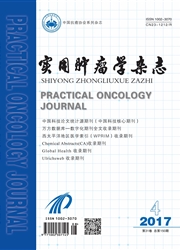

 中文摘要:
中文摘要:
腋结阴性乳腺癌是乳腺癌常见的类型。随着早期筛查及诊疗意识的提高,腋结阴性乳腺癌的比例逐步上升。虽然腋结阴性乳腺癌复发转移风险低于腋结阳性乳腺癌,但其并不等于低复发风险乳腺癌。因此,准确评价腋结阴性乳腺癌复发转移的高危因素,进行风险评估,对临床合理化用药的选择具有积极的指导意义。本文综合国内外最新研究进展,探讨传统复发转移相关因素及以尿激酶型纤溶酶原激活物/纤溶酶原激活物抑制因子1、21基因检测、70基因检测、肿瘤相关巨噬细胞为代表的新型预测因子在腋结阴性乳腺癌预后评价中的作用及其对治疗决策的影响。
 英文摘要:
英文摘要:
Node negative breast cancer is a prevalent form of breast cancer .With the improvement of breast cancer screening and disease awareness ,the rates of node negative breast cancer are gradually increasing . Although node negative breast cancer patients have much lower recurrence rates as compared with node positive patients,node-negative breast cancer is unequal to a low risk disease .Thus,it is important for oncologist to esti-mate the risk factors of node negative disease ,to carry out risk assessment and to guide the best regimen for these patients.In current review ,we discuss the value of traditional prognostic factors and new prognostic factors ,such as the urokinase -type plasminogen activator/plasminogen activator inhibitor 1,oncotype DX,MammaPrint and tumor associated macrophages ,on the predictive and treatment decisions in node negative breast cancer .
 同期刊论文项目
同期刊论文项目
 同项目期刊论文
同项目期刊论文
 期刊信息
期刊信息
